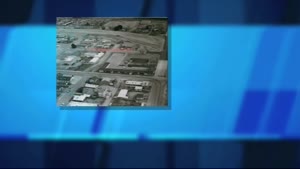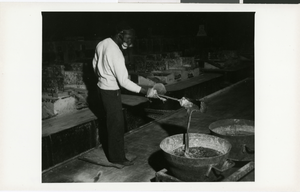Search the Special Collections and Archives Portal
Search Results

Las Vegas African American Community Conversations, Part 2: Education, Economy and Integration: video
Date
Archival Collection
Description
The Las Vegas African American Community Conversations is a four part, one hour round table conversation with local Las Vegans. They share their powerful stories and great history, with topics ranging from “Migration, Civil Rights, Education, Church, Entertainment and the Early Legal Community”. Part Two: A conversation about “Education, Economy and Integration” MODERATOR- Sonya Horsford Ed.D. PANELISTS- Dr. Esther Langston (Professor UNLV) Verlia Davis-Hoggard (Director of Clark County Social Services-Retired) Idan M. Gaines (Regional Representative for Senator Harry Reid) Dr. Linda Young (President-CCSD Board of Trustees)
Moving Image
The African American Academy Parent Handbook, 1996-1999
Level of Description
Archival Collection
Collection Name: Marzette Lewis Papers
Box/Folder: Box 16 (Restrictions apply)
Archival Component
A Cultural Celebration of African-American Heritage Kwanzaa, 1993
Level of Description
Archival Collection
Collection Name: Marzette Lewis Papers
Box/Folder: Box 14 (Restrictions apply)
Archival Component

Las Vegas African American Community Conversations, Part 1: Migration, Work, and Community Emergence: video
Date
Archival Collection
Description
The Las Vegas African American Community Conversations is a four part, one hour round table conversation with local Las Vegans. They share their powerful stories and great history, with topics ranging from “Migration, Civil Rights, Education, Church, Entertainment and the Early Legal Community”. Part One: A conversation about “Early Migration, Work and Community Emergence”. MODERATOR- Trish Geran ( Author/Community Activist) PANELISTS- Lucille Bryant (Community Activist) Jackie Brantley (Former Director-Office of Governor Kenny Guinn) Hannah Brown (Urban Chamber of Commerce) David L. Washington (1st Black Chief of Las Vegas Fire & Rescue Department) Brenda J. Williams (President-Westside School Alumni Foundation)
Moving Image

Photograph of an African American worker at the Basic Magnesium Plant in Henderson, Nevada, January 20, 1944
Date
Archival Collection
Description
View of an African American man pouring liquid magnesium into a container at the Basic Magnesium plant in Henderson, Nevada.
Image
Vegas PBS Interviews for the African Americans in Las Vegas: a Collaborative Oral History Project
Identifier
Abstract
Oral history interviews with Ruby Amie Pilot, Eva G. Simmons, Melvin Sanders, Jarmilla McMillan-Arnold, Hannah Brown, Sonny Thomas, and Claytee White conducted by Vegas PBS on April 01, 2013, April 02, 2013, April 12, 2013, and November 19, 2013 for the African Americans in Las Vegas: a Collaborative Oral History Project. In these interviews, the participants discuss their early lives and moving to Las Vegas, Nevada. Pilot talks about segregation on the Las Vegas Strip, integration, and the importance of church activities in the African American community. Simmons describes her career as a teacher, the schools on the Westside, and businesses on Jackson Street. Thomas describes the funeral industry and his role as a funeral director. McMillan-Arnold talks about segregated Las Vegas, African American entertainers, and the issue of homelessness on the Westside. Brown remembers growing up on the Westside, segregated schools, and her role as President of the National Coalition of 100 Black Women – Las Vegas chapter. Lastly, Sanders discusses his childhood in Las Vegas, being the son of a preacher, and the redevelopment of the Westside.
Archival Collection
100 Las Vegas African American Educators Past and Present, 2005
Level of Description
Archival Collection
Collection Name: Alpha Kappa Alpha Sorority, Incorporated, Theta Theta Omega Chapter Records
Box/Folder: Box 06
Archival Component
African-American employee at Basic Magnesium Incorporated, 1943 March 11
Level of Description
Archival Collection
Collection Name: Henderson Public Library Photograph Collection on Henderson, Nevada
Box/Folder: Folder 05
Archival Component
African-American employee at Basic Magnesium Incorporated, 1944 January 20
Level of Description
Archival Collection
Collection Name: Henderson Public Library Photograph Collection on Henderson, Nevada
Box/Folder: Folder 06
Archival Component
African-American employees at Basic Magnesium Incorporated, approximately 1942-1945
Level of Description
Archival Collection
Collection Name: Henderson Public Library Photograph Collection on Henderson, Nevada
Box/Folder: Folder 06
Archival Component
